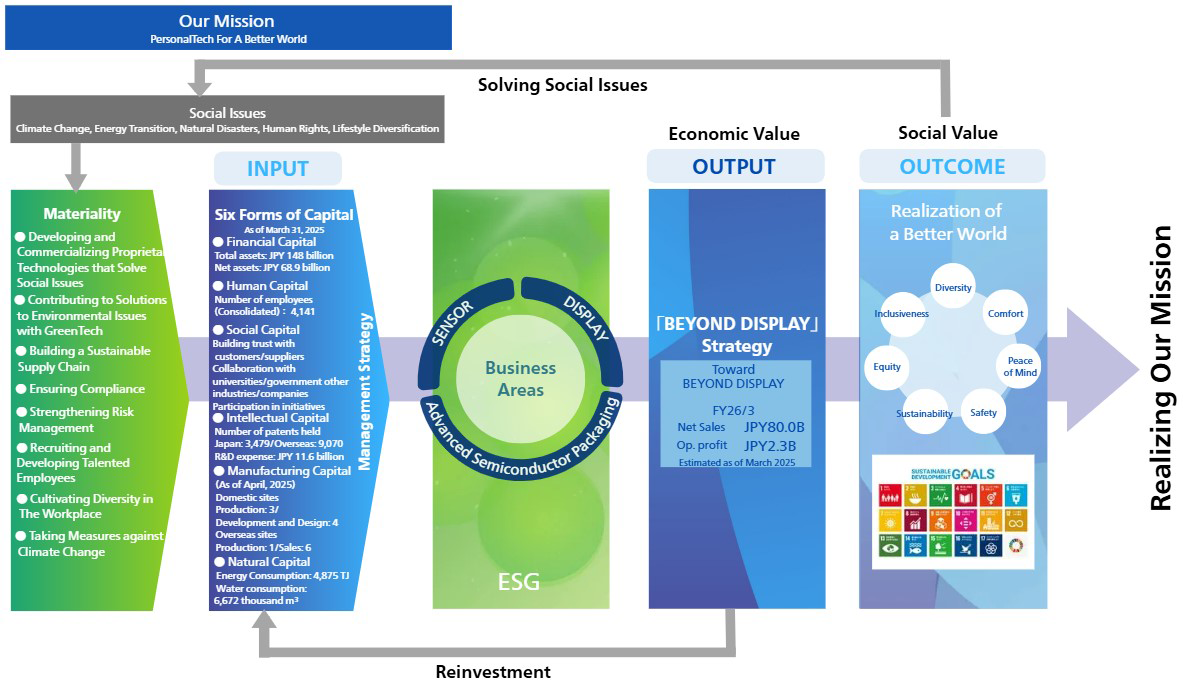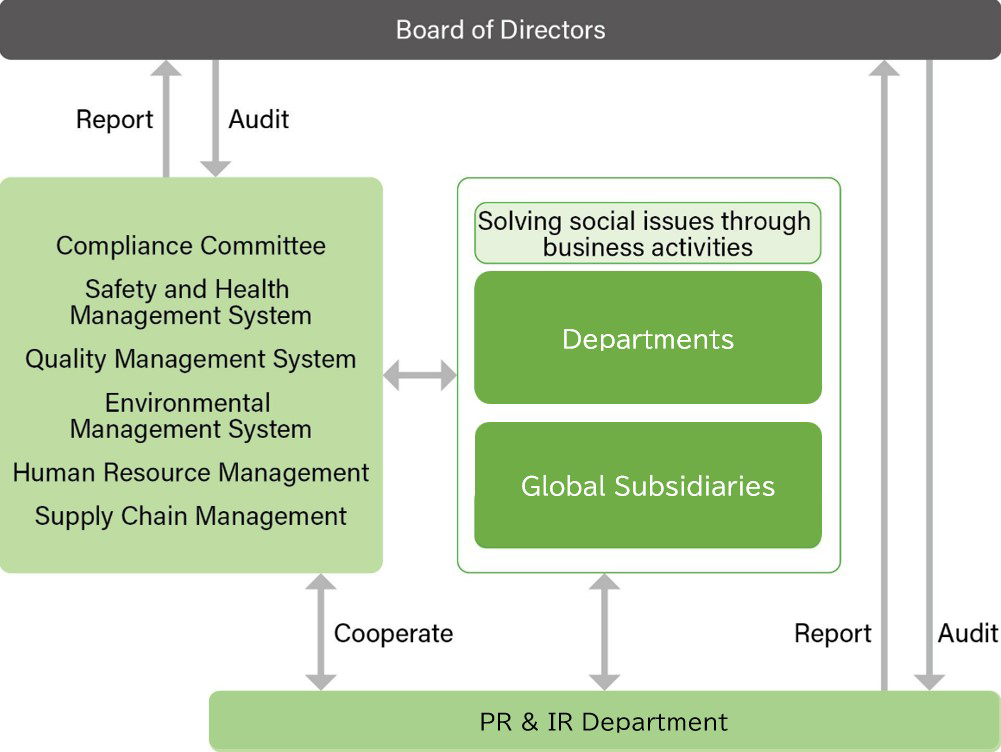-
Sustainability Management


PersonalTech for a Better World
JDI believes that with novel ideas and a limitless drive for better technology JDI can build a world where people can thrive. With JDI’s wide range of products, JDI can improve the lived experiences of people around the world.

Sustainability management
JDI Sustainability Policy
JDI’s mission is “PersonalTech For A Better World.” We believe that people, society, and the world being healthy are fundamental to achieving our mission.
(1)Compliance with JDI Ethics
JDI has established a code of ethics, JDI Ethics, and seek compliance to it from all employees in order to ensure ethical management and support people, society, and the world being healthy. JDI Ethics is the foundation for all of JDI’s activities. JDI Ethics calls for respecting human rights, maintaining and improving the workplace environment, working for global environmental protection, maintaining good relationships with local communities, avoiding actions that are inappropriate and in conflict with socially-accepted norms, and acting sincerely in accordance with sound public morals.
(2)Co-Existence and Co-Creation with All Stakeholders
JDI strives to co-create social value and maintain good relationships with all stakeholders, including society broadly, customers and business partners, competitors, shareholders and investors, and employees.
(3)Sustainable Growth
Based on the above policies, JDI works to generate sustainable growth as a company by contributing to the achievement of fully-realized and prosperous societies, reducing the environmental load across the supply chain, supporting the success of local communities and society, and carrying out effective governance.
Organization and Structures for Sustainability
We have established multiple committees and management systems related to the environment, society, and governance, such as an environmental management system and compliance committee, to address ESG issues. Each committee and management system provide reports to the Board of Directors in a timely and appropriate manner. We have also established a PR & IR department, responsible for sustainability promotion activities, to carry out initiatives for the realization of a sustainable society and improve long-term corporate value. The PR & IR department cooperates with each committee and management system to oversee ESG initiatives carried out by each department and promote company-wide initiatives. The PR & IR department provides reports on overall sustainability activities to the Board of Directors. In addition to above mentioned initiatives, we are working on the development of proprietary technologies and creation of new businesses to solve social issues through business activities.

| Human Rights | Human Resource Development | Labor Practices, Safety, and Health | Environment | Fair Operating Practices, Ethics | Value Creation | |
|---|---|---|---|---|---|---|
| Compliance Committee | ● | ● | ● | ● | ||
| Safety and Health Management System | ● | ● | ||||
| Environmental Management System (ISO 14001) |
● | ● | ● | |||
| Safety and Health Management System (ISO9001/IATF16949) | ● | |||||
| Human Resource Management | ● | ● | ● | ● | ● | |
| Supply Chain Management | ● | ● | ● | ● | ||
| Solving social issues through business activities | ● |
Materiality
To realize future value for all stakeholders, JDI has identified materiality as issues to be addressed by JDI and its group companies. By working on each of the materiality issues, we will create customer and societal value as a company essential to social development and promote our sustainable growth.
JDI’s Materiality
"JDI has identified its major challenges from the perspective of the degree of importance in the context of JDI’s risks and opportunities, as well as in the context of its stakeholders, taking into account the demands of society such as international guidelines and initiatives, and then identified major challenges to be addressed and reported them to the Board of Directors."
Approach to Determining Materiality

With regard to human capital, an aspect of materiality, we will promote the maximization of the value of each employee through various initiatives, as well as ensuring the diversity of the workforce in order to improve employee engagement and build an organization that will continue to create new value. Regarding the response to climate change, we have started to work on climaterelated scenario analysis, risk and opportunity selection, financial impact assessment in accordance with TCFD recommendations, and accelerated initiatives aimed at realizing a decarbonized society.
Materiality and the Progress of Its Initiatives
| Category | Materiality | Policy for Initiatives | FY2024 Results and Achievements | Action Plan and Goals |
|---|---|---|---|---|
| Creating Value and Solving Social Issues Through Business Activities | Developing and Commercializing Proprietary Technologies that Solve Social Issues |
|
|
|
| Contributing to Solutions to Environmental Issues with GreenTech | ||||
| Strengthening Management Base | Building a Sustainable Supply Chain |
|
|
|
| Ensuring Compliance |
|
|
|
|
| Strengthening Risk Management |
|
|
|
|
| Human Capital | Recruiting and Developing Talented Employees |
|
|
|
| Cultivating Diversity in The Workplace |
|
|
|
|
| Environment | Taking Measures against Climate Change* |
|
|
|
* Each value for climate change response targets domestic production bases.
